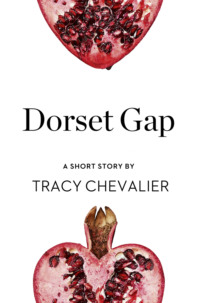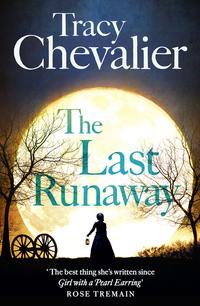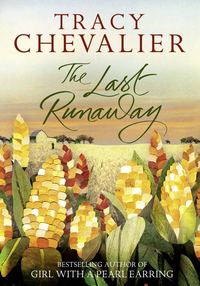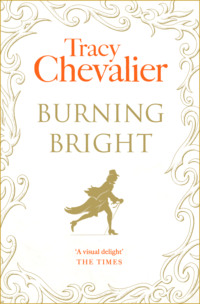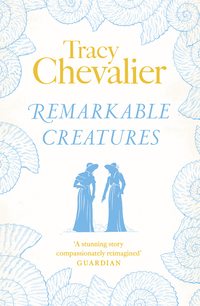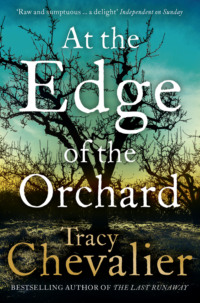
Полная версия
The Virgin Blue
‘Bonjour,’ I said, feeling foolish.
‘Bonjour.’ He shifted slightly in his seat and gestured to the chair next to him. ‘Café?’
I hesitated. ‘Oui, s’il vous plaît,’ I said at last. I sat down and he nodded at the waiter. For a moment I felt acutely embarrassed and cast my eyes out over the Tarn so I wouldn’t have to look at him. It was a big river, about 100 yards wide, green and placid and seemingly still. But as I watched I noticed there was a slow roll to the water; I kept my eyes on it and saw occasional flashes of a dark, rust-red substance boiling to the surface and then disappearing again. Fascinated, I followed the red patches with my eyes.
The waiter arrived with the coffee on a silver tray, blocking my view of the river. I turned to the librarian. ‘That red there in the Tarn, what is it?’ I asked in French.
He answered in English. ‘Clay deposits from the hills. There was a landslide recently that exposed the clay under the soil. It washes down into the river.’
My eyes were drawn back to the water. Still watching the clay I switched to English. ‘What’s your name?’
‘Jean-Paul.’
‘Thank you for the library card, Jean-Paul. That was very nice of you.’
He shrugged and I was glad I hadn’t made a bigger deal of it.
We sat without speaking for a long time, drinking our coffee and looking at the river. It was warm in the late May sun and I would have taken off my jacket but I didn’t want him to see the psoriasis on my arms.
‘Why aren’t you at the library?’ I asked abruptly.
He looked up. ‘It’s Wednesday. Library’s closed.’
‘Ah. How long have you worked there?’
‘Three years. Before that I was at a library in Nîmes.’
‘So that’s your career? You’re a librarian?’
He gave me a sideways look as he lit a cigarette. ‘Yes. Why do you ask?’
‘It’s just – you don’t seem like a librarian.’
‘What do I seem like?’
I looked him over. He was wearing black jeans and a soft salmon-coloured cotton shirt; a black blazer was draped over the back of his chair. His arms were tanned, the forearms densely covered with black hair.
‘A gangster,’ I replied. ‘Except you need sunglasses.’
Jean-Paul smiled slightly and let smoke trickle from his mouth so that it formed a blue curtain around his face. ‘What is it you Americans say? “Don’t judge a book by its cover”.’
I smiled back. ‘Touché.’
‘So why are you here in France, Ella Tournier?’
‘My husband is working as an architect in Toulouse.’
‘And why are you here?’
‘We wanted to try living in a small town rather than in Toulouse. We were in San Francisco before, and I grew up in Boston, so I thought a small town would be an interesting change.’
‘I asked why are you here?’
‘Oh.’ I paused. ‘Because my husband is here.’
He raised his eyebrows and stubbed out his cigarette.
‘I mean, I wanted to come. I was glad for the change.’
‘You were glad or you are glad?’
I snorted. ‘Your English is very good. Where did you learn it?’
‘I lived in New York for two years. I was studying for a library science degree at Columbia University.’
‘You lived in New York and then came back here?’
‘To Nîmes and then here, yes.’ He gave me a little smile. ‘Why is that so surprising, Ella Tournier? This is my home.’
I wished he would stop using Tournier. He was looking at me with the smirk I’d first seen on his face at the library, impenetrable and condescending. I would’ve liked to see his face as he wrote out my library card: had he made that into a superior act as well?
I stood up abruptly and fumbled in my purse for some coins. ‘It’s been nice talking, but I have to go.’ I laid the money on the table. Jean-Paul looked at it and frowned, shaking his head almost imperceptibly. I turned red, scraped the coins up and turned to go.
‘Au revoir, Ella Tournier. Enjoy the Henry James.’
I spun round. ‘Why do you keep using my last name like that?’
He leaned back, the sun in his eyes so that I couldn’t see his expression. ‘So you will grow accustomed to it. Then it will become your name.’
Delayed by the postal strike, my cousin’s reply arrived on June 1st, about a month after I’d written to him. Jacob Tournier had written two pages of large, almost indecipherable scrawl. I got out my dictionary and began to work through the letter, but it was so hard to read that after looking up several words without success I gave up and decided to use the bigger dictionary at the library.
Jean-Paul was talking to another man at his desk as I walked in. There was no change in his demeanour or expression but I noted with a satisfaction that surprised me that he glanced at me as I passed. I took the dictionary volumes to a desk and sat with my back to him, annoyed with myself for being so aware of him.
The library dictionary was more helpful but there were still words I couldn’t find, and more words I simply couldn’t read. After spending fifteen minutes on one paragraph, I sat back, dazed and frustrated. It was then that I saw Jean-Paul, leaning against the wall to my left and watching me with an amused expression that made me want to slap him. I jumped up and thrust the letter at him, muttering, ‘Here, you do it!’
He took the sheets, gave them a cursory glance and nodded. ‘Leave it with me,’ he said. ‘See you Wednesday at the café.’
On Wednesday morning he was sitting at the same table, in the same chair, but it was cloudy this time and there were no bubbling clay deposits in the river. I sat opposite him rather than in the adjacent seat, so that the river was at my back and we had to look at each other. Beyond him I could see into the empty café: the waiter, reading a newspaper, glanced up as I sat down and abandoned his paper when I nodded.
Neither of us said anything while we waited for our coffee. I was too tired to make small talk; it was the strategic time of the month and the dream had woken me three nights running. I hadn’t been able to get back to sleep and had lain hour after hour listening to Rick’s even breathing. I’d been resorting to cat naps in the afternoons, but they made me feel ill and disoriented. For the first time I’d begun to understand the look I had seen on the faces of new mothers I’d worked with: the bewildered, shattered expression of someone robbed of sleep.
After the coffee came Jean-Paul placed Jacob Tournier’s letter on the table. ‘There are some Swiss expressions in it,’ he said, ‘which maybe you would not understand. And the handwriting was difficult, though I have read worse.’ He handed me a neatly written page of translation,
My dear cousin,
What a pleasure to receive your letter! I remember well your father from his brief visit to Moutier long ago and am happy to make the acquaintance of his daughter.
I am sorry for the delay in my reply to your questions, but they required that I should look through my grandfather’s old notes about the Tourniers. It was he who had a great interest in the family, you see, and he undertook many researches. In fact he made a family tree – it is difficult to read or reproduce it for you in this letter, so you will have to visit us and see it.
Nonetheless I can give you some facts. The first mention of a Tournier in Moutier was of Etienne Tournier, on a military list in 1576. Then there was a baptism registered in 1590 of another Etienne Tournier, the son of Jean Tournier and Marthe Rougemont. There are few records left from that time, but later there are many mentions of Tourniers – the family tree is abundant from the eighteenth century to the present.
The Tourniers have had many occupations: tailor, innkeeper, watchmaker, schoolteacher. A Jean Tournier was even elected mayor in the early nineteenth century.
You ask about French origins. My grandfather sometimes said that the family originally came from the Cévennes. I do not know from where he had this information.
It pleases me that you have interest in the family, and I hope you and your husband will visit us sometime soon. A new member of the Tournier family is always welcome to Moutier.
Yours etc.
Jacob Tournier
I looked up. ‘Where’s Cévennes?’ I asked.
Jean-Paul gestured over my shoulder. ‘Northeast of here. It’s an area in the mountains north of Montpellier, west of the Rhône. Around the Tarn and to the south.’
I fastened on to the one familiar bit of geography. ‘This Tarn?’ I pointed with my chin at the river below, hoping he hadn’t noticed that I’d thought Cévennes was a town.
‘Yes. It’s a very different river further east, closer to its source. Much smaller, quicker.’
‘And where’s the Rhône?’
He flicked me a look, then reached into his jacket pocket for a pen, and quickly sketched the outline of France on a napkin. The shape reminded me of a cow’s head: the east and west points the ears, the top point the tuft of hair between the ears, the border with Spain the square muzzle. He drew dots for Paris, Toulouse, Lyons, Marseilles, Montpellier, squiggly vertical and horizontal lines for the Rhône and the Tarn. As an afterthought he added a dot next to the Tarn and to the right of Toulouse to mark Lisle-sur-Tarn. Then he circled part of the cow’s left cheek just above the Riviera. ‘That’s the Cévennes.’
‘You mean they were from a place nearby?’
Jean-Paul blew out his lips. ‘From here to the Cévennes is at least 200 kilometres. You think that is near?’
‘It is to an American,’ I replied defensively, well aware that I’d recently chided my father for making the same assumption. ‘Some Americans will drive 100 miles to a party. But look, it’s an amazing coincidence that in your big country—’ I gestured at the cow’s head – ‘my ancestors came from a place pretty close to where I live now.’
‘An amazing coincidence,’ Jean-Paul repeated in a way that made me wish I’d left off the adjective.
‘Maybe it wouldn’t be so hard then to find out more about them, since it’s nearby.’ I was remembering Madame Sentier saying that to know about my French ancestors would make me feel more at home. ‘I could just go there and—’ I stopped. What would I do there exactly?
‘You know your cousin said it is a family story that they came from there. So it is not certain information. Not concrete.’ He sat back, shook a cigarette out of the pack on the table and lit it in one fluid movement. ‘Besides, you already know this information about your Swiss ancestors, and there exists a family tree. They have traced the family back to 1576, more information than most people know about their families. That is enough, no?’
‘But it would be fun to dig around. Do some research. I could look up records or something.’
He looked amused. ‘What kind of records, Ella Tournier?’
‘Well, birth records. Death records. Marriages. That kind of thing.’
‘And where are you finding these records?’
I flung out my hands. ‘I don’t know. That’s your job. You’re the librarian!’
‘OK.’ Appealing to his vocation seemed to settle him; he squared himself in his chair. ‘You could start with the archives at Mende, which is the capital of Lozère, one of the départements of the Cévennes. But I think you do not understand this word “research” you are so easy to use. There are not so many records from the sixteenth century. They did not keep records then the way the government began to do after the Revolution. There were church records, yes, but many were destroyed during the religious wars. And especially the Huguenot records were not kept securely. So it is all very unusual that you find something about the Tourniers if you go to Mende.’
‘Wait a minute. How do you know they were, uh, Huguenots?’
‘Most of the French who went to Switzerland then were Huguenots looking for a safe place, or who wanted to be close to Calvin at Geneva. There were two main waves of migration, in 1572 and 1685, first after the Massacre of Saint Bartholomew, then with the revocation of the Edict of Nantes. You can read about them at the library. I won’t do all your work for you,’ he added tauntingly.
I ignored his gibe. I was beginning to like the idea of exploring a part of France where I might have ancestors. ‘So you think it’s worth me going to the archives at Mende?’ I asked, foolishly optimistic.
He blew smoke straight up into the air. ‘No.’
My disappointment must have been obvious, for Jean-Paul tapped the table impatiently and remarked, ‘Cheer up, Ella Tournier. It is not so easy, finding out about the past. You Americans who come over here looking for your roots think you will find it out all in one day, no? And then you go to the place and take a photograph and you feel good, you feel French for one day, yes? And the next day you go looking for ancestors in other countries. That way you claim the whole world for yourselves.’
I grabbed my bag and stood up. ‘You’re really enjoying this, aren’t you?’ I said sharply. ‘Thanks for your advice. I’ve really learned a lot about French optimism.’ I deliberately tossed a coin on the table; it rolled past Jean-Paul’s elbow and fell to the ground, where it bounced on the concrete a few times.
He touched my elbow as I began to walk away. ‘Wait, Ella. Don’t go. I did not know I was upsetting for you. I try just to be realistic.’
I turned on him. ‘Why should I stay? You’re arrogant and pessimistic, and you make fun of everything I do. I’m mildly curious about my French ancestors and you act like I’m tattooing the French flag on my butt. It’s hard enough living here without you making me feel even more alien.’ I turned away once more but to my surprise found I was shaking; I felt so dizzy that I had to grab onto the table.
Jean-Paul jumped up and pulled out a chair for me. As I dropped into it he called inside to the waiter, ‘Un verre d’eau, Dominique, vite, s’il te plaît.’
The water and several deep breaths helped. I fanned my face with my hands; I’d turned red and was sweating. Jean-Paul sat across from me and watched me closely.
‘Maybe you take your jacket off,’ he suggested quietly; for the first time his voice was gentle.
‘I—’ But this was not the moment for modesty and I was too tired to argue; my anger at him had faded the moment I sat back down. Reluctantly I shrugged my jacket off. ‘I’ve got psoriasis,’ I announced lightly, trying to pre-empt any awkwardness about the state of my arms. ‘The doctor says it’s from stress and lack of sleep.’
Jean-Paul looked at the patches of scaly skin like they were a curious modern painting.
‘You do not sleep?’ he asked.
‘I’ve been having nightmares. Well, a nightmare.’
‘And you tell your husband about it? Your friends?’
‘I haven’t told anyone.’
‘Why you do not talk to your husband?’
‘I don’t want him to think I’m unhappy here.’ I didn’t add that Rick might feel threatened by the dream’s connection to sex.
‘Are you unhappy?’
‘Yes,’ I said, looking straight at Jean-Paul. It was a relief to say it.
He nodded. ‘So what is the nightmare? Describe it to me.’
I looked out over the river. ‘I only remember bits of it. There’s no real story. There’s a voice – no, two voices, one speaking in French, the other crying, really hysterical crying. All of this is in a fog, like the air is very heavy, like water. And there’s a thud at the end, like a door being shut. And most of all there’s the colour blue everywhere. Everywhere. I don’t know what it is that scares me so much, but every time I have the dream I want to go home. It’s the atmosphere more than what actually happens that frightens me. And the fact that I keep having it, that it won’t go away, like it’s with me for life. That’s the worst of all.’ I stopped. I hadn’t realized how much I’d wanted to tell someone about it.
‘You want to go back to the States?’
‘Sometimes. Then I get mad at myself for being scared off by a dream.’
‘What does the blue look like? Like that?’ He pointed to a sign advertising ice cream for sale in the café. I shook my head.
‘No, that’s too bright. I mean, the dream blue is bright. Very vivid. But it’s bright and yet dark too. I don’t know the technical words to describe it. It reflects lots of light. It’s beautiful but in the dream it makes me sad. Elated too. It’s like there are two sides to the colour. Funny that I remember the colour. I always thought I dreamed in black and white.’
‘And the voices? Who are they?’
‘I don’t know. Sometimes it’s my voice. Sometimes I wake up and I’ve been saying the words. I can almost hear them, as if the room has just then gone silent.’
‘What are the words? What are you saying?’
I thought for a minute, then shook my head. ‘I don’t remember.’
He fixed his eyes on me. ‘Try. Close your eyes.’
I did as he said, sitting still as long as I could, Jean-Paul silent next to me. Just as I was about to give up, a fragment floated into my mind. ‘Je suis un pot cassé,’ I said suddenly.
I opened my eyes. ‘I am a broken pot? Where did that come from?’
Jean-Paul looked startled.
‘Can you remember any more?’
I closed my eyes again. ‘Tu es ma tour et forteresse,’ I murmured at last.
I opened my eyes. Jean-Paul’s face was screwed up in concentration and he seemed far away. I could see his mind working, travelling over a vast plain of memory, scanning and rejecting, until something clicked and he returned to me. He fixed his eyes on the ice-cream sign and began to recite:
Entre tous ceux-là qui me haient
Mes voisins j’aperçois
Avoir honte de moi:
Il semble que mes amis aient
Horreur de ma rencontre,
Quand dehors je me montre.
Je suis hors de leur souvenance,
Ainsi qu’un trespassé.
Je suis un pot cassé.
As he spoke I felt a pressure in my throat and behind my eyes. It was grief.
I held tightly to the arms of my chair, pushing my body hard against its back as if to brace myself. When he finished I swallowed to ease my throat.
‘What is it?’ I asked quietly.
‘The thirty-first psalm.’
I frowned at him. ‘A psalm? From the Bible?’
‘Yes.’
‘But how could I know it? I don’t know any psalms! Hardly in English, and certainly not in French. But those words are so familiar. I must have heard it somewhere. How do you know it?’
‘Church. When I was young we had to memorize many psalms. But also it was in my studying at one time.’
‘You studied psalms for a library science degree?’
‘No, no, before that, when I studied history. The history of the Languedoc. That is what I really do.’
‘What’s Languedoc?’
‘An area all around us. From Toulouse and the Pyrenees all the way to the Rhône.’ He drew another circle on his napkin map, encompassing the smaller circle of the Cévennes and a lot of the cow’s neck and muzzle. ‘It was named for the language once spoken there. Oc was their word for oui. Langue d’oc – language of oc.’
‘What did the psalm have to do with Languedoc?’
He hesitated. ‘Well, that’s curious. It was a psalm the Huguenots used to recite when bad things happened.’
That night after supper I finally told Rick about the dream, describing the blue, the voices, the atmosphere, as accurately as I could. I left out some things too: I didn’t tell him that I’d been over this territory with Jean-Paul, that the words were a psalm, that I only had the dream after sex. Since I had to pick and choose what I told him, the process was more self-conscious and not nearly as therapeutic as it had been with Jean-Paul, when it had come out involuntarily and naturally. Now that I was telling it for Rick’s sake rather than my own, I found I had to shape it more into a story, and it began to detach itself from me and take on its own fictional life.
Rick took it that way too. Maybe it was the way I told it, but he listened as if he were half paying attention to something else at the same time, a radio on in the background or a conversation in the street. He didn’t ask any questions the way Jean-Paul had.
‘Rick, are you listening to me?’ I asked finally, reaching over and pulling his ponytail.
‘Of course I am. You’ve been having nightmares. About the colour blue.’
‘I just wanted you to know. That’s why I’ve been so tired recently.’
‘You should wake me up when you have them.’
‘I know.’ But I knew I wouldn’t. In California I would have woken him immediately the first time I had the dream. Something had changed; since Rick seemed to be himself, it must be me.
‘How’s the studying going?’
I shrugged, irritated that he’d changed the subject. ‘OK. No. Terrible. No. I don’t know. Sometimes I wonder how I’m ever going to deliver babies in French. I couldn’t say the right thing when that baby was choking. If I can’t even do that, how can I possibly coach a woman through labour?’
‘But you delivered babies from Hispanic women back home and managed.’
‘That’s different. Maybe they didn’t speak English, but they didn’t expect me to speak Spanish either. And here all the hospital equipment, all the medicine and the dosages, all that will be in French.’
Rick leaned forward, elbows anchored on the table, plate pushed to one side. ‘Hey, Ella, what’s happened to your optimism? You’re not going to start acting French, are you? I get enough of that at work.’
Even knowing I’d just been critical of Jean-Paul’s pessimism, I found myself repeating his words. ‘I’m just trying to be realistic.’
‘Yeah, I’ve heard that at the office too.’
I opened my mouth for a sharp retort, but stopped myself. It was true that my optimism had diminished in France; maybe I was taking on the cynical nature of the people around me. Rick put a positive spin on everything; it was his positive attitude that had made him successful. That was why the French firm approached him; that was why we were here. I shut my mouth, swallowing my pessimistic words.
That night we made love, Rick carefully avoiding my psoriasis. Afterwards I lay patiently waiting for sleep and the dream. When it came it was less impressionistic, more tangible than ever. The blue hung over me like a bright sheet, billowing in and out, taking on texture and shape. I woke with tears running down my face and my voice in my ears. I lay still.
‘A dress,’ I whispered. ‘It was a dress.’
In the morning I hurried to the library. The woman was at the desk and I had to turn away to hide my disappointment and irritation that Jean-Paul wasn’t there. I wandered aimlessly around the two rooms, the librarian’s gaze following me. At last I asked her if Jean-Paul would be in any time that day. ‘Oh no,’ she replied with a small frown. ‘He won’t be here for a few days. He has gone to Paris.’
‘Paris? But why?’
She looked surprised that I should ask. ‘Well, his sister is getting married. He will return after the weekend.’
‘Oh. Merci,’ I said and left. It was strange to think of him having a sister, a family. Dammit, I thought, pounding down the stairs and out into the square. Madame from the boulangerie was standing next to the fountain talking to the woman who had first led me to the library. Both stopped talking and stared at me for a long moment before turning back to each other. Damn you, I thought. I’d never felt so isolated and conspicuous.
That Sunday we were invited to lunch at the home of one of Rick’s colleagues, the first real socializing we’d done since moving to France, not counting the occasional quick drink with people Rick had met through work. I was nervous about going and focused my worries on what to wear. I had no idea what Sunday lunch meant in French terms, whether it was formal or casual.


